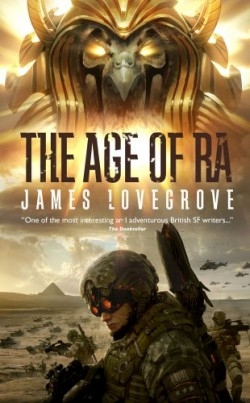
Age of Ra
Two present-day opposing forces meet in the Middle East. One side launches an ambush and nearly annihilates its foe. This opening scene to The Age of Ra promises the book will be a high-stakes thriller. And it is. The twist comes when we learn that this world is controlled by the Egyptian gods of old.
Author James Lovegrove has created a modern-day tale of selfish deities playing out their personal vendettas using the earth as a game board and humans as chess pieces. The Egyptian gods, led by Ra, have defeated all other religions and have claimed different parts of the world for themselves. The world is at war, mirroring the clashes between the different gods.
Lt. David Westwynter is fighting in one of these wars. Having survived a brutal attack on his covert unit, he faces certain and painful death in the desert. When all is almost lost, he is captured by the Liberators of Luxor, a rogue paramilitary faction. Faced with the choice of death or joining the raiders, David decides to give up the life he has known and embark on a dangerous new journey with a group that has declared itself opposed to the gods.
David learns more about the Liberators from Zafirah, a beautiful, fiery rebel who has aligned herself with the group’s leader, a masked man known only as the Lightbringer. When David questions the wisdom of provoking the gods, Zafirah declares, “Man, for the first time in history, could rule himself. He could be master of his own destiny.” As his attraction to Zafirah grows, David needs to discover what it is about the enigmatic Lightbringer that seems so familiar to him.
What no one knows is that Ra is almost as fed up with his fellow gods as the rebels are. In an attempt to bring peace between them, Ra visitws the gods only to learn they can only be true to their nature. As the earthly battles increase and the Lightbringer’s movement gains ground, Ra is forced to wonder why the gods have let this rebellious movement continue. Could other allegiances be at work?
Lovegrove does an excellent job of weaving Egyptian terminology into today’s vernacular. While a reference guide to the gods’ names and relationships would have been helpful, this creative book takes a fresh look at relig-ion, free will, and destiny.
Reviewed by
Lora Schrock
Disclosure: This article is not an endorsement, but a review. The publisher of this book provided free copies of the book to have their book reviewed by a professional reviewer. No fee was paid by the publisher for this review. Foreword Reviews only recommends books that we love. Foreword Magazine, Inc. is disclosing this in accordance with the Federal Trade Commission’s 16 CFR, Part 255.
